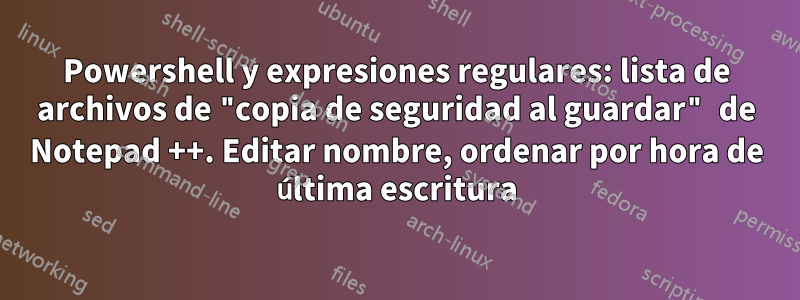
# Microsoft Windows [Version 10.0.17134.648]
# powershell 5.1.17134.48
# Calculate time to complete task using Notepad++ "backup on save" feature. Create a copy and paste table of files sorted by LastWriteTime.
# Can be used as a shortcut: powershell -noexit $time = (Get-Date).AddDays(-1); gci * -exclude _*, 1* | where {$_.LastWriteTime -gt $time}| sort -property LastWriteTime -descending | Format-Table LastWriteTime, length, @{n='foo';e={$_.Name -replace '(?<=^.*\.html).*$' -replace '(?<=^.*\.jpg).*$'}} -HideTableHeaders
# start it in %userprofile%\Documents\NOTEPAD++ AUTOBACKUP
Set-Location -Path "$env:userprofile\Documents\NOTEPAD++ AUTOBACKUP"
# how old a file? Today? 4 days old?
$time = (Get-Date).AddDays(-1)
# $time = (Get-Date).AddDays(-4)
# do you want to exclude files with -exclude? Do you want to include with -include?
gci * -exclude _*, 1* | where {$_.LastWriteTime -gt $time}| sort -property LastWriteTime -descending | Format-Table LastWriteTime, length, @{n='foo';e={$_.Name -replace '(?<=^.*\.html).*$' -replace '(?<=^.*\.jpg).*$'}} -HideTableHeaders
gci * -exclude _*, 1* | where {$_.LastWriteTime -gt $time} | sort -property LastWriteTime -descending | Format-Table LastWriteTime, length, Name -HideTableHeaders
# gci * | where {$_.LastWriteTime -gt $time} | sort -property LastWriteTime -descending | Format-Table LastWriteTime, length, @{n='foo';e={$_.Name -replace '(?<=^.*\.html).*$' -replace '(?<=^.*\.jpg).*$'}} -HideTableHeaders
# gci * -include [0-9][0-9][0-9]*, avail* | where {$_.LastWriteTime -gt $time} | sort -property LastWriteTime -descending | Format-Table LastWriteTime, length, @{n='foo';e={$_.Name -replace '(?<=^.*\.html).*$' -replace '(?<=^.*\.jpg).*$'}} -HideTableHeaders
salidas:
5/4/2019 10 : 47 : 27 AM 114036 springhill_falls2bd750_885.jpg
5/4/2019 10 : 45 : 25 AM 1301974 springhill_falls2bd750_885.psp
5/4/2019 10 : 37 : 08 AM 19268 springhill_falls2bd13.html
5/4/2019 10 : 37 : 08 AM 94007 available13.html
5/4/2019 10 : 37 : 08 AM 36729 index.html
5/4/2019 10 : 32 : 16 AM 62801 aj.php
y:
5/4/2019 10 : 47 : 27 AM 114036 springhill_falls2bd750_885.jpg.2019-05-04_104748.bak
5/4/2019 10 : 45 : 25 AM 1301974 springhill_falls2bd750_885.psp.2019-05-04_105221.bak
5/4/2019 10 : 37 : 08 AM 19268 springhill_falls2bd13.html.2019-05-04_105856.bak
5/4/2019 10 : 37 : 08 AM 94007 available13.html.2019-05-04_105657.bak
5/4/2019 10 : 37 : 08 AM 36729 index.html.2019-05-04_105657.bak
5/4/2019 10 : 32 : 16 AM 62801 aj.php.2019-05-04_103229.bak
Microsoft Windows [Versión 10.0.17134.648]
powershell 5.1.17134.48
Calcule el tiempo para completar la tarea utilizando la función "copia de seguridad al guardar" Notepad++ / NPP / Notepad Plus.
Cree una tabla de copiar y pegar de archivos ordenados por LastWriteTime.
Se puede utilizar como atajo:
powershell -noexit $time = (Get-Date).AddDays(-1); gci * -exclude _*, 1* |
where {$_.LastWriteTime -gt $time} | sort -property LastWriteTime -descending |
Format-Table LastWriteTime, length, @{n='foo';e={$_.Name
-replace '(?<=^.*\.html).*$' -replace '(?<=^.*\.jpg).*$'}} -HideTableHeaders
Inícielo en el directorio donde va la copia de seguridad automática de NPP. Mis archivos están respaldados en%userprofile%\Documents\NOTEPAD++ AUTOBACKUP
Este script crea una salida de tabla formateada con los nombres de archivo editados, el tamaño, la fecha y la hora cada vez que se escribió el archivo. Es fácil modificar qué archivos buscar, cómo editar los nombres de los archivos y cuántos días tiene el archivo que desea buscar. Es una forma cómoda de realizar un seguimiento de cuánto tiempo se trabaja en un archivo, cuánto tiempo llevó completar una tarea y cuánto tiempo lleva un proyecto.
Consulte la respuesta de LotPings a continuación para obtener información sobre la expresión regular.
Respuesta1
Usaría una expresión regular conaserción de longitud cero hacia atráspara eliminar todo después html de$_.Name
Esto se puede hacer con una propiedad calculada ya sea en a Select-Objecto también en aFormat-*
Get-ChildItem -File |
Format-Table @{n='foo';e={$_.Name -replace '(?<=^.*\.html).*$'}},Name -HideTableHeaders
Salida de muestra:
available13.html available13.html.2019-03-26_081523.bak
index.html index.html.2019-03-26_081538.bak
Respuesta2
Puedes agregar una nueva propiedad conAdd-Membercomo esto
$time = (Get-Date).AddDays(-4)
$files = gci * -include index*,avail* | where {$_.LastWriteTime -gt $time}
foreach ($f in $files) {
$f | Add-Member noteproperty newName -Value `
$f.Name.Substring(0, $f.Name.Length - ".yyyy-mm-dd_iiiiii.bak".Length)
}
$files | Format-Table -HideTableHeaders newName,Length,LastWriteTime
Tenga en cuenta que el fragmento anterior supone que sus nombres siempre terminan en .yyyy-mm-dd_iiiiii.bak. Si tienen algún otro formato, entonces debes incluir esa información en la pregunta y es posible que necesites usar otros métodos de cadena como reemplazar, subcadena... para eliminar la parte innecesaria.


